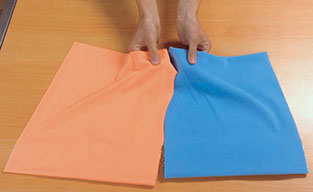
Fabrics to Keep You Warmer
Thermal effusivity is a measure of how a material exchanges heat with another material. Measuring the thermal effusivity of textiles reveals the rate at which a fabric will absorb heat when it first comes in contact with skin. A proposed new ASTM International standard, WK43374, Test Method for Measurement of Thermal Effusivity of Fabrics Using a Guarded Modified Transient Plane Source (MTPS) Instrument, will be useful in measuring the thermal properties of textiles.
ASTM member Shannon Yawney, a research analyst in product innovation at Mark's, notes that, when a textile is tested to the proposed method, a low thermal effusivity rate will indicate that a fabric is slow to absorb heat. To relate that to apparel, a fabric with a low thermal effusivity would feel warmer to the initial touch and would be slower to transfer heat away from the body, keeping you warmer.
"For summer apparel, in which someone wants to stay cool, a higher thermal effusivity is desirable," says Yawney. "With a high thermal effusivity, a fabric quickly draws heat away from the skin on initial contact."
Yawney says that, while the proposed standard is for apparel fabrics, it could be used for other household textiles, such as bedsheets, since manufacturers are concerned with individuals maintaining thermal comfort while sleeping. In addition, the proposed standard could also find use in the upholstery and automobile industries, in which the thermal effusivity of a material is of interest.
According to Yawney, the proposed standard will become a benchmark scale test method for textile mills to compare and develop new technologies for managing heat. In addition, apparel product developers will find WK43374 useful for selecting fabrics by providing an objective way to evaluate how a fabric manages heat from the body.
WK43374 is being developed by Subcommittee D13.51 on Conditioning, Chemical and Thermal Properties, part of ASTM International Committee D13 on Textiles. All interested parties are invited to participate in the ongoing development of WK43374. D13.51 will be looking for laboratories to participate in an interlaboratory study for the proposed standard.
CONTACT Technical Information: Shannon Yawney, Mark's • Calgary, Alberta, Canada • Phone: 403-692-7045 • Email: shannon.yawney@marks.com O ASTM Staff: Jennifer Rodgers • Phone: 610-832-9694 • Email: jrodgers@astm.org O Upcoming Meeting: Jan. 25-28, 2015 • January Committee Week • New Orleans, La.
 SN Home
SN Home Archive
Archive Advertisers
Advertisers Masthead
Masthead RateCard
RateCard Subscribe
Subscribe Email Editor
Email Editor